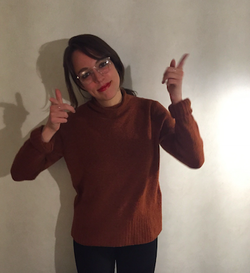
Hi, I'm Becca. I am the non-fiction book critic of the Washington Post, an editor at The Point, and a contributing editor at The Boston Review . My essay collection, All Things Are Too Small, was published Metropolitan Books in the US and Virago in the UK in April 2024. The New York Times called it "splendidly immodest" and "exhilarating" and The Guardian called it "bracing and brilliant." It was a New York Times editors' pick and a New Yorker weekly recommendation. Finally, I am also a PhD candidate (on indefinite hiatus) in philosophy at Harvard, but i remain perhaps delusionally convinced that someday I will finish my dissertation. These days I live in Washington, DC, with this person, whom I love. Here you can find all of my Washington Post pieces, which will come out each week, generally speaking.
To keep up with my writing/rantings, subscribe to my substack here. As a writer: I have contributed essays, book reviews, and the occasional art review to publications like The TLS, The Nation, The New York Times Book Review, The New Yorker, The Atlantic, Liberties, Bookforum, Art in America, The Yale Review, The Baffler, and more. These days, I write mostly for the Washington Post about non-fiction, but occasionally I write essays on fiction and whatever else for other venues. I am the winner of the first annual Robert B. Silvers Prize for Literary Criticism (see more here) and the 2023 Nona Balakian Citation for Excellence in Reviewing (see more here). In 2017, I was a finalist for a National Magazine Award in the essays/criticism category. A few authors I especially love are Joseph Roth, Italo Svevo, Henry James, Henry Green, Heinrich von Kleist, Marie de France, and Norman Rush. My agent is Anna Sproul-Latimer of Neon Literary. As a (lapsed?) philosopher: I am primarily interested in aesthetics (especially aesthetic value and its relationship to other types of value), the philosophy of love and sex, and the history of German philosophy, especially Martin Heidegger, although I have increasingly consuming secondary interests in political philosophy. In "The Good, the Bad, and the Ugly," published in The British Journal of Aesthetics, I defend aestheticism, the view that aesthetic value is sometimes a partial grounds of moral value. I describe aestheticism in more detail in a chapter in the Oxford Handbook of Ethics and Art. If I ever get around to completing it, my dissertation will be about some combination of the following: what it is to be a beautiful person, why evolutionary psychologists are wrong about human beauty, the ethics of exclusionary romantic/sexual/aesthetic preferences, and what role the state should play in ameliorating inequitable distributions of intimate "goods." I hold a first-class MPhil in the history and philosophy of science from the University of Cambridge and a B.A., summa cum laude with high honors, from Dartmouth College, where I studied philosophy & German (and cultivated an enduring distaste for fraternities). I receive many emails asking for advice about graduate school applications. I have answered some frequently asked questions on this page. As I note there, I do not consider myself an expert in how to write a successful graduate school application, and I urge all prospective grad students to consult resources online, as well as supervisors who have served on admissions committees, rather than me! Before the pandemic, I followed Hegel in regarding nature as geistlos, but now, like any good Heideggerian, I am a big fan of hiking. Here I am in the Berkshires, which I love
|
|
The Irish novelist Sally Rooney is a normal person. Or so she is always insisting, often with a trace of defensive desperation. Never mind that she published her debut novel, Conversations with Friends (2017), at the tender age of 26, or that her second novel, Normal People (2018), was long-listed for the Man Booker Prize. Never mind that she is the youngest-ever recipient of the Costa Book Prize. No, Rooney protests, her many accolades and immense popularity notwithstanding, she is just like everyone else. Here she is in Vanity Fair: “I do think it’s very possible I’ll look back on this period of my life when my books were being talked about on Twitter and think, ‘Wow, what a crazy thing to happen to a just totally average person.’” And in O, The Oprah Magazine: “I feel pretty much like everyone else.” And in the Belfast-based literary journal the Tangerine: “Everyone has a life. I haven’t had a particularly interesting one.”
Of course, genuinely normal people do not have the chance to advertise their normalcy in Vanity Fair or Oprah’s magazine. Would Rooney still be so eager to downplay her achievements if there were any risk that she would actually succeed in deflecting attention? I have to say, I hope not. Read more here.
3 Comments
James Wood, haters claim, is a hater. The New Yorker’s most influential and polarizing critic hates gaudy postmodernists like Paul Auster and cute sentimentalists like Nicole Krauss. He can’t stand the Cambridge fixture George Steiner, whom he pillories as “a statue that wishes to be a monument,” and he dismisses Donna Tartt as “children’s literature.” Most famously, he loathes fidgety, frantic novels by the likes of Thomas Pynchon and Zadie Smith, works of so-called “hysterical realism” that can’t shut up and sit still. In 2004, the editors of n+1 denounced him as a “designated hater.”
In fact Wood’s talent for appreciation far outstrips his gift for denigration. Of the twenty-eight essays collected in Serious Noticing, an anthology of pieces Wood has published over the past twenty years, only two are negative. And even when he is hating, Wood remains eager to discover something to admire. In “Hysterical Realism,” published in 2000, he emphasizes that Zadie Smith “seems capable of almost anything”; in “Paul Auster’s Shallowness,” from 2009, he prefaces his assault by insisting that Auster’s novel Invisible “has charm and vitality in places.” Read more here. Magda Szabo’s novel “Abigail” begins with an ending. When we first encounter 14-year-old Gina Vitay, “the change that came about in her life robbed her of so much it was as if a bomb had destroyed her home.” The change in question — the sudden dismissal of Gina’s beloved governess — is just one of many upheavals soon to launch a cosseted teenager into an abrupt adulthood. Read more here!
THE RUSSIAN JEWISH NOVELIST VASILY GROSSMAN grasped an important corollary to the now tired truism that the personal is political: he knew, that is, that a morally defensible politics must be personal. At the beginning of Life and Fate, his 1960 opus, he observes that the “very uniformity” of the barracks in a Nazi concentration camp serves to dehumanize. In contrast, “[a]mong a million Russian huts you will never find even two that are exactly the same. Everything that lives is unique. It is unimaginable that two people, or two briar-roses, should be identical.” Read more here.
|
Archives
June 2022
Categories |

 RSS Feed
RSS Feed